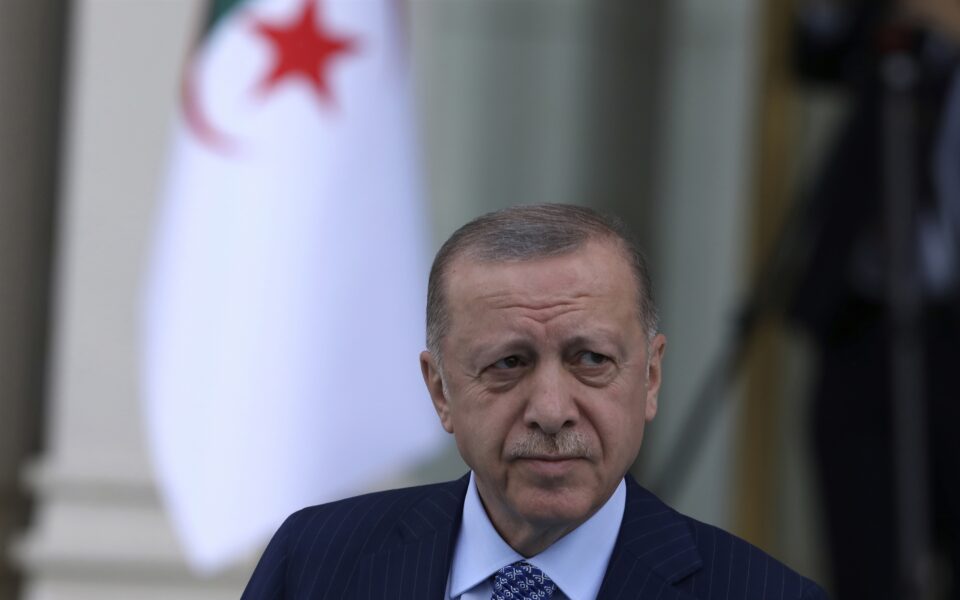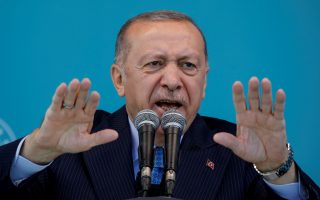Erdogan’s revisionism

Turkish President Recep Tayyip Erdogan has been very busy these past few months, both on the broader international stage and in terms of Greek-Turkish relations. On the international front, we note his reluctance to impose sanctions on Russia – thereby aligning Turkey with the Western world, which has come together in opposition to the invasion of Ukraine – his refusal to return or at least undo the damage done by Turkey’s acquisition of the Russian S-400 missile defense system, and, more recently, his threat to veto Sweden’s and Finland’s accession into NATO.
How can we explain such actions that fly directly in the face of the West, while giving a nod to Vladimir Putin’s Russia? In Erdogan’s view, they are proof of an independent foreign policy that defies obligations concomitant with NATO membership and preliminary negotiations for European Union accession, and that leans toward the East, in league with Russia, Iran and China.
What this does is allow Turkey to keep one foot in the West, which is not ready to shut the door on it despite its constant transgressions, with the reasoning that Turkey is a valuable strategic ally in a sensitive area fraught with unpredictable dangers, and in a fluid geopolitical state. The West’s belief in Turkey’s value allows the latter to play the game on both sides, even to the extent of acting as mediator between Russia and Ukraine, with the West’s compliance. Therefore, as long as Turkey does not distance itself from Western institutions, the West will continue to tolerate its vagaries in the name of its strategic position, and the size of its territory and population.
Nevertheless, Turkey is bearing the brunt of sanctions that are having a serious economic impact on its people. At the same time, the US resistance to Turkey’s acquisition of F-35 jets and objections in Congress to the upgrade and purchase of its F-16s have put Ankara in an extremely awkward position, which it is now trying to extricate itself from by dangling its acquiescence to NATO’s two new candidates as the quid pro quo against America’s refusal to agree to the fighter jets.
We could say that Turkey is holding the West to ransom by invoking its strategic position; and as long as Ankara itself wants the country to remain attached to the Western institutions, the West will not be showing it the door. This is even more so now, as Turkey heads to elections in 2023 and there is a chance that Erdogan will be defeated. A regime change will not, of course, automatically mean a change in Turkish foreign policy unless the election is won by Istanbul Mayor Ekrem Imamoglu, who appears to be the ideal exception in the rather bleak lineup of Turkish political forces. Even if this were to happen, however, we should not expect any radical shifts, given the challenges of overturning a policy that seems to have the blessing of the majority of Turkish people and of the deep state.
All of this brings us to the matter of Greek-Turkish relations. There is no doubt that Turkey has exceeded all precedent with its recent actions and statements – from official lips too. The recent violation by Turkish fighter jets of the airspace over Evros in northeastern Greece is a severe infringement that Turkey has never attempted before. This is not to dismiss other similar behavior – like the overflights above the eastern Aegean islands – but it is an unprovoked intervention into continental territory, which cannot be brushed off with the excuse of the jets’ excessive speed (though this is a thin excuse for the island overflights too, given the frequency of violations). It is an act that can be regarded as an invasion of sovereign territory and one that could justify the activation of Greece’s defenses. That the Greek side chose not to treat it this way is evidence of the government’s good will and of a deliberate effort to deny Turkey the opportunity to use this incident as a precursor to something bigger.
There is no doubt that Turkey has exceeded all precedent with its recent actions and statements – from official lips too
On the scale of seriousness, though, this brief incident appears more severe than those at sea in 2020; there, at least, Turkey seemed to be challenging Greece’s sovereign rights rather than its actual sovereignty, and that in non-delineated areas whose delineation is a condition for any legal claims for exclusive rights of exploitation.
The overflight into continental territory has not been Turkey’s only infringement in recent weeks, of course. It comes on top of the overflights above our easternmost islands – which have become almost routine – as well as what appears to be a fresh attempt to instrumentalize the refugee crisis by allowing new waves of migrants to attempt the crossing into the country. This is not to mention recent comments by the Turkish president shutting down any future discussion with the Greek prime minister. There is no reason to expand on this further, however, because the Turkish president is renowned for his inconsistency and has often made such statements in the past he then reneged on.
Be that as it may, things are not looking good.
Erdogan’s overall behavior indicates that he does not rule out the possibility of conflict with Greece; in fact, he may be courting it. And this is why efforts to modernize our armed forces are absolutely justified, as is the cultivation of stable alliances with countries that can guarantee our territorial integrity. For the time being, the only agreement to contain this specific caveat is that signed with France. Greece’s agreements with the United States and other countries entail no such safeguards. What they do ensure is better deterrence, which could make Turkey think twice before it makes the fatal move.
Ultimately, however, the only guarantee we really have is Greece’s calm and cool response to multiple provocations from a country we are doomed by nature to live next to as neighbors.
Christos Rozakis is an emeritus professor at the National and Kapodistrian University of Athens.





